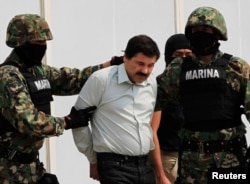Mexico's notorious drug kingpin, Joaquin "El Chapo" Guzman, was still on the loose Monday, two days after he escaped from a maximum security prison for the second time in 14 years.
Mexican police engaged in a massive manhunt, setting up highway checkpoints, stepping up border security and shutting down an international airport.
But there was no sign of Guzman, widely considered to be the world's richest and most powerful drug lord before his capture last year.
He slipped away from the Altiplano prison, about 90 kilometers west of Mexico City, late Saturday after 17 months behind bars. Authorities say he climbed down a 10-meter ladder in a shaft under his prison cell's shower area and disappeared into a sophisticated 1.5-kilometer tunnel with ventilation, lighting and a motorcycle on rails apparently used to move dirt in the tunnel's construction.
At the far end of then tunnel, a ladder led up into a gray brick building situated on a construction site on the side of a hill surrounded by pasture land. Investigators released a video showing the hole inside the building's dirt-covered floor. A bed and a kitchen were in the building, indicating that people may have lived there.
'An affront'
On an official visit to Paris, Mexican President Enrique Pena Nieto called Guzman's escape "an affront to the state" and demanded an investigation into whether prison guards had helped him flee.
Mexican Attorney General Arely Gomez said 30 people who worked at the prison are being questioned "so we can determine what their legal situation will be."
Mexican Senator Luis Miguel Barbosa, also in Paris for the state visit, said, "This is regrettable, very bad, because it without doubt affects the image of Mexico in the world."
US support
The United States, where Guzman faces drug cartel charges, pledged any support Mexico needs in recapturing Guzman. American authorities had sought to extradite Guzman to stand trial in the U.S. but were rebuffed by Mexico.
Latin American analyst Mark Jones of Rice University said Guzman’s second escape, following one from a Mexican prison in 2001, is a major embarrassment for Pena Nieto's government, whose crowning achievement in Mexico's war on drug cartels and their elusive kingpins was the capture of Guzman, who had been on the run for 13 years after his earlier escape.
Jones said there is little U.S. law enforcement can do in the effort to recapture Guzman.
Mexico analyst Barry Carr of Australia’s Latrobe University also said Guzman’s latest escape is one of a number of events in the past 18 months that have tarnished the anti-corruption image of the Pena Nieto administration.
He said Guzman’s escape points out a flaw in U.S.-Mexican anti-drug efforts since U.S. authorities do not know for certain whether members of Mexican law enforcement can be trusted with intelligence information.
The Associated Press reported that U.S. Drug Enforcement Administration officials knew of several Guzman escape plans almost immediately after his capture last year, although not Saturday night's escape.
The drug agency documents claim that Guzman was directing some of his Sinaloa drug cartel operations from prison.
"Despite being imprisoned in a 'high security' facility, DEA reporting further indicates Guzman was able to provide direction to his son and other cartel members via the attorneys who visited [him] in prison and possibly through the use of a cellphone provided...by corrupt prison guards," one document said.
The Sinaloa cartel is known for the elaborate tunnels built underneath the Mexico-U.S. border to transport cocaine, methamphetamines and marijuana, with ventilation, lighting and even railcars to easily move products.
The Sinaloa cartel controls most of the border crossings for illegal drugs between Mexico and the United States.





